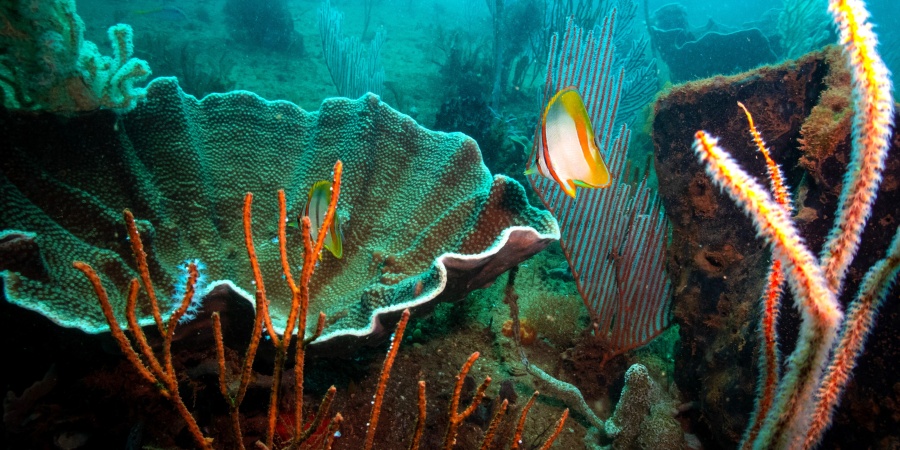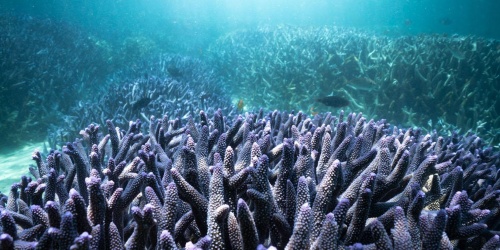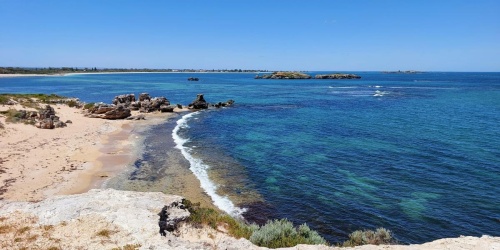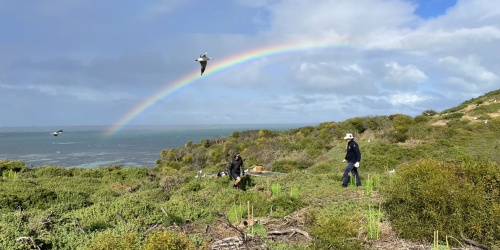
Underwater in the Exmouth gulf. Photo by Oceanwise
To let us know how you use and what you value about the Exmouth Gulf and surrounding waters please complete the Exmouth Gulf marine values mapper.
Whether you enjoy snorkelling, fishing, crabbing, whale watching or bird watching, you can record your favourite locations for activities on the interactive map.
The local knowledge you provide will help inform the design of the proposed marine park in the eastern and southern portions of Exmouth Gulf.
The survey is open for five weeks until 5pm on 11 May 2025. The survey takes about 10-25 minutes, and you must be over 18 to participate. It works best if accessed using a laptop or computer rather than a mobile phone.
The survey is part of a research study by the University of Western Australia, and has UWA Human ethics approval.
Why is a marine park proposed for Exmouth Gulf?
Exmouth Gulf is an amazing reservoir of globally significant marine species and the source of life-giving processes: it is a critical part of the food web that sustains nearby Ningaloo Reef.
The Gulf is a refuge for one of the world’s last stable populations of dugongs and the largest known nursery for the world’s most successfully recovering population of humpback whales. Unusual mixed pods of Indo-Pacific and bottlenose dolphins are often seen in the area. The Gulf offers vital foraging and nesting habitat for hawksbill, green, flatback and loggerhead turtles. It is a global hotspot for threatened sawfish and wedgefish, and at least 15 species of sea snakes, including two species previously thought to be extinct.
During the Australian summer, Exmouth Gulf is home to 27 species of migratory and 11 resident shorebird species and is an internationally significant area for several migratory shorebird species.
Exquisite coral reefs and sponge gardens populate some areas. Extensive mangroves along the gulf’s eastern fringes are carbon storage powerhouses (storing four times more carbon per hectare than rainforests). Salt flats and algal mats along the shoreline also have immense ecological importance as they are able to extract nitrogen from the environment that forms the basis of the food chain for the gulf’s abundant marine animals.
Exmouth Gulf also has immense social, lifestyle and cultural value to all Western Australians. Indigenous cultural heritage of the area dates back at least 32,000 years, and includes important ceremonial sites. Connection to Country is important to the belief system and cultural practices of the Traditional Owners.
This abundance of marine life and beauty confers the gulf with significant recreational and tourism value. It is highly valued by local and visiting fishers who fish in its shallow waters, mangrove-lined creek systems, shoals and reefs while enjoying its tranquil wilderness setting. The Gulf also supports a valuable commercial prawn fishery.
A year-long study by the EPA—which involved face-to-face engagement with stakeholders and the Exmouth community, public consultation and targeted meetings with local government, business and Traditional Owners—found that the eastern and southern portions of Exmouth Gulf were critical WA assets requiring a high level of protection.
The marine park proposal
In December 2021, the State Government committed to establish a new marine park in the eastern and southern parts of the Exmouth Gulf. This proposed marine park will be located within the existing Exmouth Gulf Prawn Fishery designated nursery area and coexist with the existing commercial fishing operations.
A planning process for the proposed Exmouth Gulf marine park led by DBCA and Nganhurra Thanardi Garrbu Aboriginal Corporation, with assistance from the Department of Primary Industries and Regional Development (DPIRD), will begin in 2025.
How will Traditional Owners be involved in managing the proposed marine park?
We acknowledge Baiyungu, West Coastal Thalanyji and Yinikurtura People as the original custodians of the land and waters of the Exmouth Gulf.
The Baiyungu, Thalanyji and Yinikurtura Traditional Owners have a strong connection to their Country and its resources, and a cultural obligation to care for and protect it.
The State Government intends that the proposed Exmouth Gulf marine park be jointly managed and jointly vested with the Nganhurra Thanardi Garrbu Aboriginal Corporation.
Economic benefits of the proposed Exmouth Gulf marine park
Marine parks stimulate the local economy through raising the profile of natural values and increasing eco and cultural tourism opportunities as well as creating jobs, including for Traditional Owners. In June 2020 Deloitte published a report: Economic contribution of Ningaloo: one of Australia's best kept secrets, which reported that in 2018-19 the value of economic activity related to Ningaloo Marine Park was $110M added to the WA economy, of which $100M was directly due to tourism.
Deloitte also found that “The unique interaction of our economy, communities and the environment is at the forefront of our thinking when it comes to planning for both resilient economies and ecosystems. We cannot have one without the other.”
In other words, maintaining recreational tourism, economic and cultural values relies on maintenance of a healthy ecosystem.
Media statements
Contact us
If you have any questions, please contact the marine planning team at exmouth.gulf@dbca.wa.gov.au
Downloads



